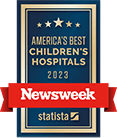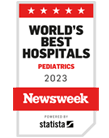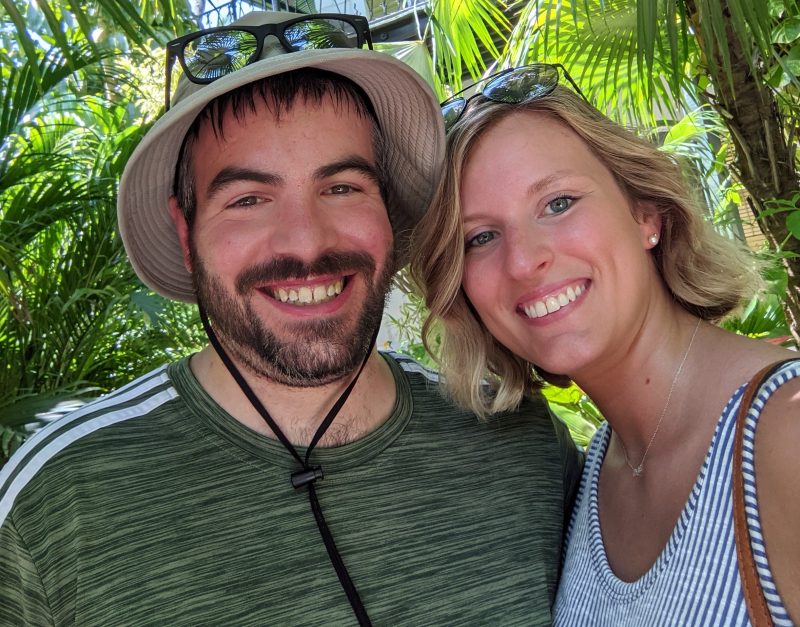
Dr. Sarah Guillette, pictured with her husband on their honeymoon in Key West, is Akron Children’s newest optometrist in our Vision Center and Scleral Lens Clinic.
No doubt about it, Dr. Sarah Guillette’s career highlight occurred when a patient she fitted with specialty contact lenses wrote and illustrated a poem for her about his positive experience and hope for a bright future. The gratitude he showed sticks with her to this day.
In fact, Dr. Guillette keeps the poem in her office to remind her of the impact she has on patients and their lives, while doing what she loves most as Akron Children’s newest optometrist in our Vision Center and Scleral Lens Clinic.
She is honored to be among the first eye-care specialists children and teens encounter when diagnosed and treated for visual disorders and eye diseases, such as strabismus. In addition, she is thrilled to launch Akron Children’s first Scleral Lens Clinic to help patients who do not tolerate or have inadequate vision in their soft contact lenses.
But what she’s most excited about is interacting and connecting with her patients, especially those eager for their first eye exams and curious about the equipment. Because it is during these times that Dr. Guillette can make a difference and experience many more memorable moments.
Why did you choose to come to Akron Children’s?
I originally came to Akron Children’s to complete my fellowship in pediatric optometry last year. However, when I was offered a position on the staff, I chose to stay because of the amazing relationships I cultivated during my fellowship and the opportunity to continue caring for a fun, yet challenging patient base.
Describe your role at Akron Children’s and what you hope to accomplish?
I joined the Vision Center staff as its third pediatric optometrist. In addition to being a primary care optometrist for children, I am excited to start Akron Children’s first specialty scleral contact lens clinic to help patients who do not tolerate soft contact lenses well, have inadequate vision in their soft lenses or have ocular conditions that require them.

Their latest adventure, Dr. Guillette and her husband honeymooned in Key West, the southernmost point of the United States.
What is your area of expertise and why did you choose it?
I chose to become a pediatric optometrist because I enjoy diagnosing and managing ocular conditions that are unique to this specific population. It’s a privilege to be among one of the first eye-care specialists that young children encounter and provide services to so many first-time patients.
When did you decide to become a provider and why?
I knew I wanted to be an optometrist since my senior year of high school. I was always fascinated by the equipment and exam techniques used at my own eye exams, and I frequently accompanied other family members to their yearly appointments just to watch. (My mother once told me this was not typical teenage behavior and suggested I look into optometry as a career).
What’s the best part of your day?
The best part of my day is getting to know and interact with all of the kids, especially the babies and young kids who are excited for their first eye exams and have lots of questions about the equipment.
What’s the most memorable thing that’s ever happened to you as a provider?
The gratitude that some patients show after being fitted with specialty contact lenses and potentially being able to see clearly again for the first time in decades is astounding. There are usually tears and/or hugs.
But, the most memorable moment was when a patient wrote and illustrated a poem about his experience and hope for the future with his new lenses. I keep the poem in my office as a reminder of the impact I can have on patients and the rest of their lives, while also providing a service that I love.
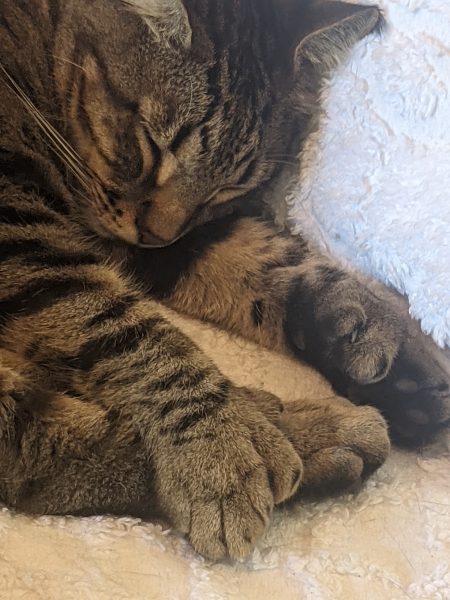
Though Dr. Guillette can’t have any pets due to allergies, she and her husband enjoyed visiting a descendant of Ernest Hemmingway’s cats, which has 6 toes and is known as a “mitten” cat.
What do you think is the hardest part of your job?
Educating patients and families about the possibility for vision loss, even at a young age, can be very difficult. The eyes are complex organs and (unlike with other injuries or diseases that can affect a child) parents cannot “see” when their child’s eyes may not be functioning properly. This can create some difficult and emotional conversations.
Do you have a favorite instructor or mentor?
One of my favorite instructors while in optometry school was Dr. Joseph Stamm, an optometrist specializing in dry eye and contact-lens management. His enthusiasm for practicing optometry and teaching others leaves an impression on all who meet him.
Where did you grow up?
I grew up in Pittsburgh, Pa.
What’s one thing about you that most people don’t know?
I can play multiple instruments, including the piano and trumpet, and was a classical tap dancer for 16 years.
What values are most important to you?
Honesty and integrity are traits that matter most to me. I try and embody both of these in my professional and personal life.
What are the small things that make your day better?
A good cup of coffee and baby/toddler smiles are the best!
What’s the last adventure you went on?
My husband and I explored Key West for our honeymoon. (Definitely go see the many 6-toed cats at Ernest Hemmingway’s old house if you get the chance. They’re so cute!)





